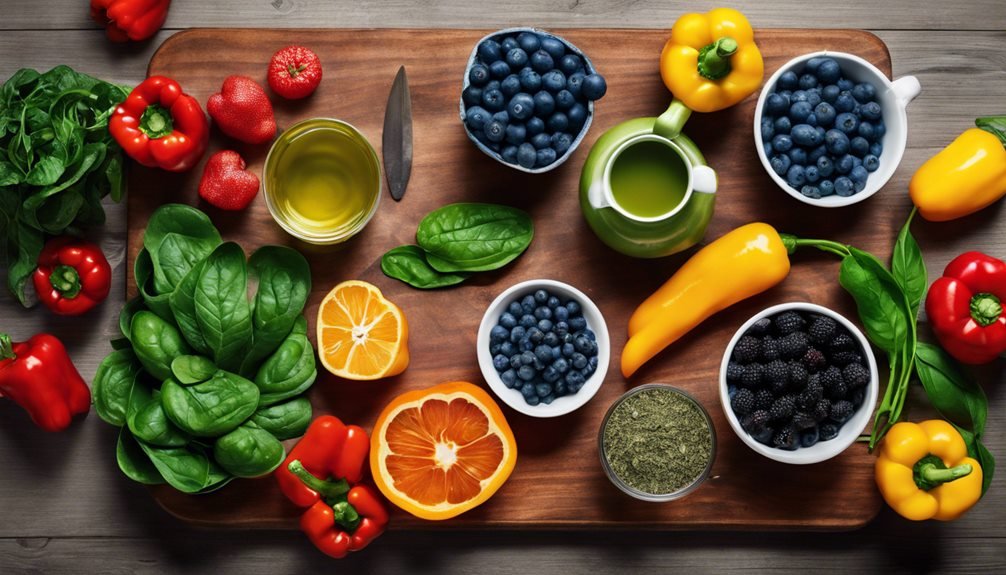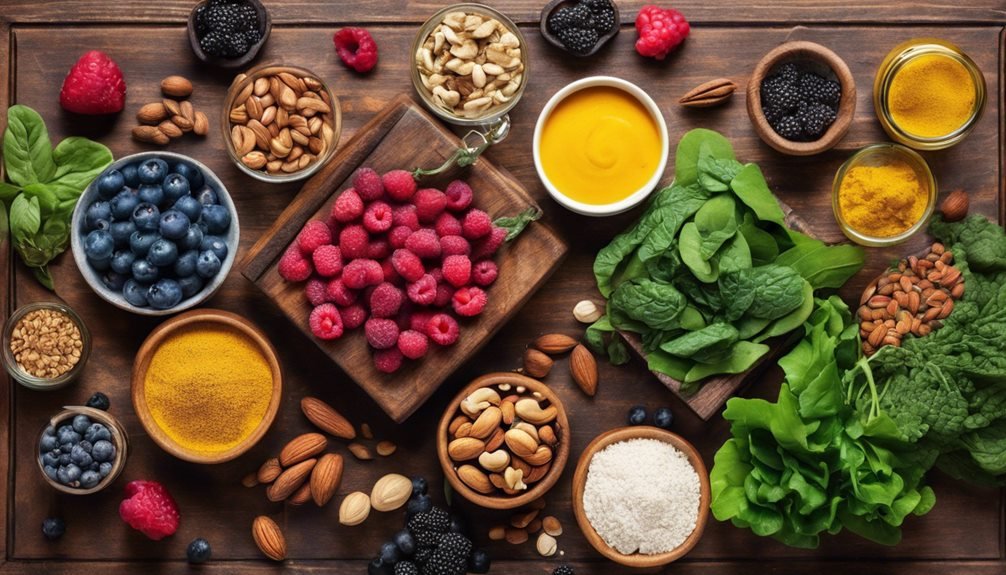Imagine a scenario where incorporating antioxidant-rich foods into your daily diet could potentially reduce your risk of cancer by up to 30%. The impact of antioxidants on cancer prevention is a topic that continues to intrigue researchers and health professionals alike. As you explore the role of antioxidants in combating cancer, you'll uncover fascinating insights into how these powerful compounds work to protect your cells from harm.
Key Takeaways
- Antioxidants reduce cancer risk by combating oxidative stress and protecting cells.
- Antioxidant-rich foods like berries and leafy greens help prevent DNA damage.
- Maintaining a diet rich in antioxidants can inhibit the oxidation process.
- Certain antioxidants, like Vitamin C, enhance the effects of cancer treatments.
- Balancing antioxidants through a varied diet is key; more isn't always better.
The Science Behind Antioxidants
When it comes to understanding the role of antioxidants in the body, it's essential to delve into the intricate science behind their functions. Antioxidants play a crucial role in combating oxidative stress, a process that occurs when there's an imbalance between free radicals and the body's ability to neutralize them.
Free radicals, produced through normal cellular processes or external factors like pollution and UV radiation, can cause damage to cells and DNA if left unchecked. This is where antioxidants come into play, as they help prevent this damage through various mechanisms.
Antioxidant mechanisms include scavenging free radicals, inhibiting the production of reactive oxygen species, and repairing oxidative damage. By neutralizing free radicals, antioxidants protect cells from harm and reduce the risk of diseases like cancer, heart disease, and neurodegenerative disorders.
Consuming a diet rich in antioxidants from fruits, vegetables, nuts, and seeds is crucial for maintaining good health and preventing oxidative stress-related damage. Understanding the science behind antioxidants empowers you to make informed choices that promote overall well-being and longevity.
Free Radicals and Cell Damage
Excessive exposure to free radicals can instigate a cascade of cellular damage, impacting the integrity and functionality of vital components within the body. Free radicals are highly reactive molecules that can cause oxidative stress, leading to damage in cell structures like proteins, lipids, and even DNA.
Oxidative stress occurs when there's an imbalance between the production of free radicals and the body's ability to neutralize them with antioxidants. This imbalance can result in harmful effects on cells, tissues, and organs, ultimately contributing to various diseases, including cancer.
One critical aspect of cell damage caused by free radicals is the potential harm to DNA. Free radicals can induce mutations in the DNA, which may lead to disruptions in normal cellular functions and potentially trigger the development of cancer.
Protecting DNA from damage caused by free radicals is essential in maintaining cellular health and preventing disease progression. This underscores the importance of antioxidants in the body's defense mechanism against oxidative stress and the preservation of DNA integrity for overall well-being.
Antioxidants vs. Cancer Development
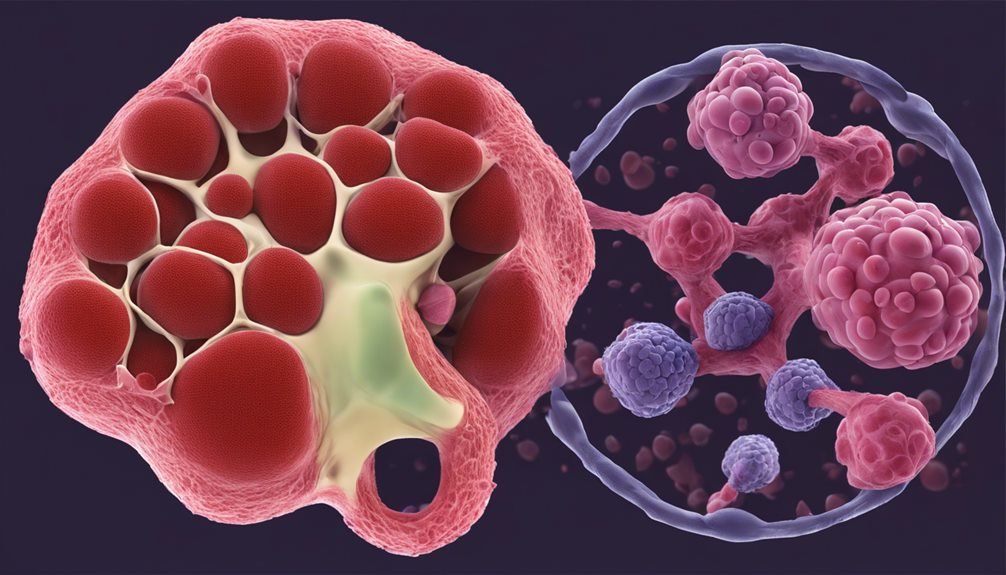
To combat the detrimental effects of free radicals on cell structures and DNA integrity, the role of antioxidants in preventing cancer development becomes paramount. Antioxidant consumption plays a crucial role in reducing cancer risk by neutralizing free radicals that can lead to cellular damage and mutations.
Studies have shown that a diet rich in antioxidants, such as vitamins C and E, beta-carotene, and selenium, can help prevent cancer by protecting cells from oxidative stress.
Antioxidants work by inhibiting the oxidation process that generates free radicals, which are known to contribute to the initiation and progression of cancer. By scavenging these harmful molecules, antioxidants help maintain the stability of cell membranes and prevent DNA damage that could lead to the development of cancerous cells.
Therefore, incorporating antioxidant-rich foods like fruits, vegetables, nuts, and seeds into your diet can be a proactive measure in reducing your cancer risk. By supporting your body's defense mechanisms with antioxidants, you can help safeguard against the potential harmful effects of free radicals and promote overall health and well-being.
Role of Antioxidants in Prevention
During cellular metabolism, reactive oxygen species are naturally produced, potentially leading to oxidative stress and damage. To combat this, incorporating antioxidants into your skincare routine can help protect your skin from oxidative damage caused by environmental factors such as UV radiation and pollution. Antioxidants like vitamins C and E, green tea extract, and resveratrol can neutralize free radicals, reducing the signs of aging like wrinkles and fine lines.
Antioxidants play a crucial role in preventing premature aging by neutralizing free radicals that contribute to skin aging. The application of antioxidant-rich skincare products can help maintain skin elasticity, improve skin texture, and reduce the appearance of age spots.
Top Antioxidant-Rich Foods
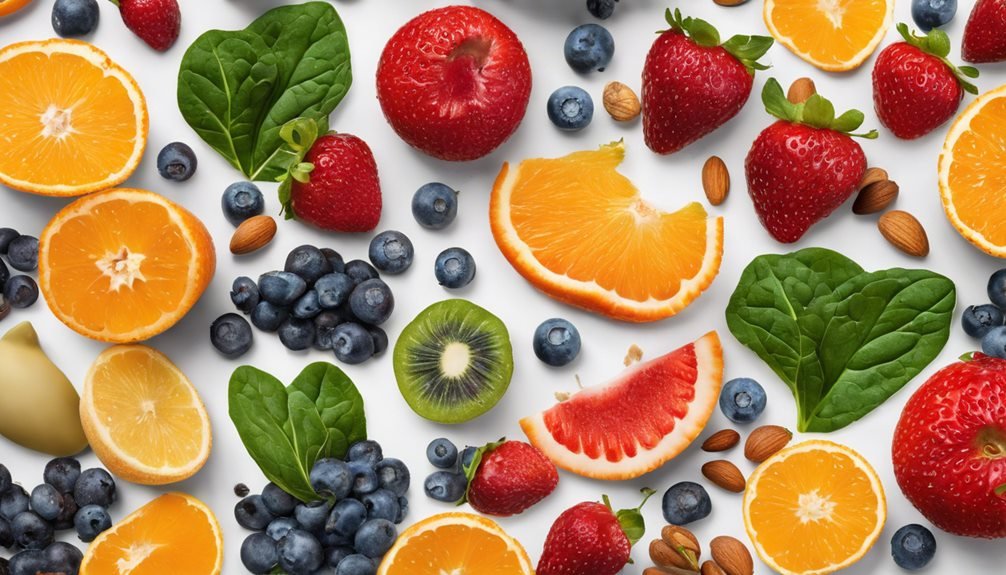
For optimal health and well-being, incorporating antioxidant-rich foods into your diet is essential. Some top antioxidant sources include berries like blueberries, strawberries, and raspberries, which are packed with vitamin C, flavonoids, and other powerful antioxidants.
Dark chocolate is another delicious option, containing flavonoids that can help reduce inflammation and improve heart health.
Nuts, such as almonds and walnuts, are rich in antioxidants like vitamin E and selenium, which can protect your cells from damage.
Additionally, leafy greens like spinach and kale are excellent choices due to their high content of antioxidants like vitamin A, vitamin C, and beta-carotene.
These antioxidant-rich foods offer numerous health benefits, including reducing the risk of chronic diseases like cancer, heart disease, and diabetes. They can also help boost your immune system, improve skin health, and promote overall well-being. By incorporating these antioxidant sources into your daily meals, you can enhance your body's defense against harmful free radicals and support long-term health.
Incorporating Antioxidants in Diet
Incorporating antioxidants into your diet is a proactive step towards maintaining your health and preventing diseases. To ensure you're getting an ample amount of antioxidants, focus on consuming a variety of colorful fruits and vegetables such as berries, spinach, kale, and bell peppers. These foods are rich in vitamins C and E, as well as other antioxidants like beta-carotene and lycopene.
Additionally, consider incorporating antioxidant-rich herbs and spices like turmeric, cinnamon, and oregano into your cooking. These flavorful additions not only enhance the taste of your meals but also provide a boost of antioxidants.
While obtaining antioxidants through whole foods is ideal, you may also consider incorporating antioxidant supplements into your routine. However, it's essential to consult with a healthcare provider before starting any new supplements to ensure they're safe and appropriate for your individual health needs.
Benefits of Antioxidant Supplements

To maximize the potential benefits of antioxidants, consider the role of supplements in supporting your overall health and well-being. Antioxidant supplements have shown efficacy in neutralizing harmful free radicals, reducing oxidative stress, and protecting cells from damage. These supplements can complement a balanced diet by providing concentrated doses of key antioxidants like vitamins C and E, beta-carotene, and selenium.
While antioxidant supplements offer potential benefits, it's essential to be aware of the potential risks associated with their use. Some studies have suggested that high doses of certain antioxidants may have harmful effects, such as interfering with the body's natural defense mechanisms or even promoting the growth of existing cancer cells.
It's crucial to consult with a healthcare provider before starting any antioxidant supplement regimen to ensure it's safe and appropriate for your individual needs.
Antioxidants in Cancer Treatment
When considering the role of antioxidants in cancer treatment, it's crucial to understand their potential impact on tumor growth and response to therapy. Antioxidants have shown both supportive and conflicting effects when used alongside chemotherapy. Some studies suggest that certain antioxidants may interfere with the effectiveness of chemotherapy drugs, while others indicate that antioxidants like vitamin C can enhance the therapeutic effects of chemotherapy by reducing toxic side effects on healthy cells.
Similarly, the relationship between antioxidants and radiotherapy is complex. While some antioxidants may protect cancerous cells from the damaging effects of radiation, others such as vitamin E could potentially enhance the sensitivity of cancer cells to radiotherapy, making the treatment more effective.
Antioxidant-rich Recipes to Try
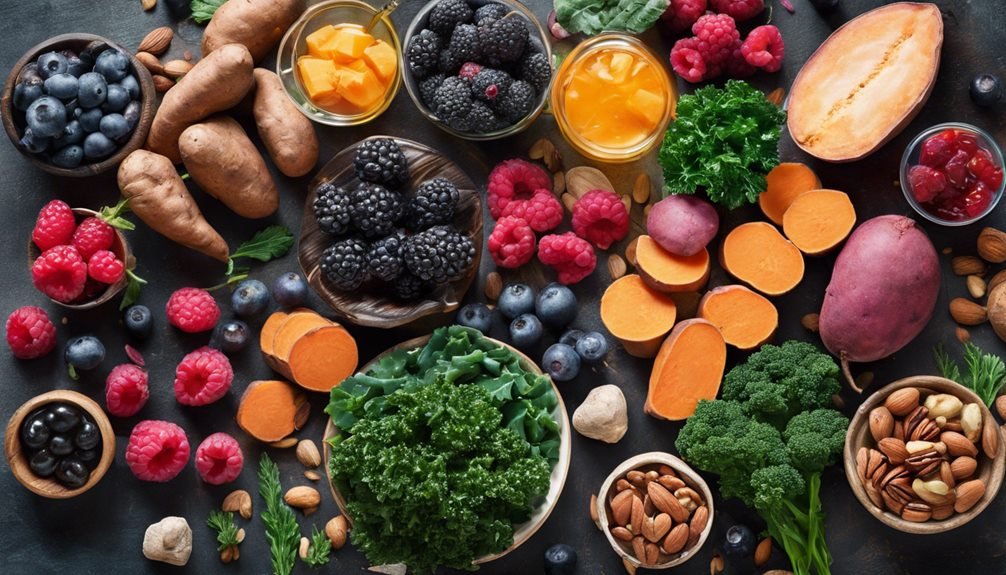
For those seeking to boost their antioxidant intake through flavorful and nutritious meals, exploring antioxidant-rich recipes can be a delightful and health-conscious culinary adventure. Incorporating antioxidant-packed smoothies and vibrant antioxidant salads into your diet can provide a delicious way to increase your daily antioxidant consumption. Here are some recipes to try:
- Antioxidant-Packed Smoothie: Blend together a cup of mixed berries, a handful of spinach, a tablespoon of chia seeds, a scoop of antioxidant-rich acai powder, and a splash of almond milk for a refreshing and nutrient-dense smoothie.
- Vibrant Antioxidant Salad: Toss together a mix of dark leafy greens, colorful bell peppers, cherry tomatoes, sliced almonds, and a drizzle of olive oil and balsamic vinegar for a vibrant and antioxidant-rich salad bursting with flavors and nutrients.
- Green Tea Infused Quinoa: Cook quinoa in green tea instead of water for a unique twist that adds a boost of antioxidants to this versatile and nutritious grain.
These recipes not only taste great but also provide a wide array of antioxidants to support your overall health and well-being.
Lifestyle Changes for Antioxidant Boost
Enhance your daily intake of antioxidants by incorporating simple yet effective lifestyle changes. To boost your antioxidant levels, consider adding antioxidant supplements to your routine. Supplements like vitamin C, vitamin E, and beta-carotene can provide an extra dose of antioxidants to help combat oxidative stress in your body.
Another way to support your antioxidant intake is through antioxidant skincare. Look for skincare products containing ingredients like green tea extract, vitamin C, and resveratrol, which can help protect your skin from free radicals and promote a healthy complexion.
In addition to supplements and skincare, focus on consuming a diet rich in fruits, vegetables, nuts, and seeds to naturally increase your antioxidant intake. These foods are packed with vitamins, minerals, and phytochemicals that act as antioxidants in the body.
Antioxidants and Immune System Support
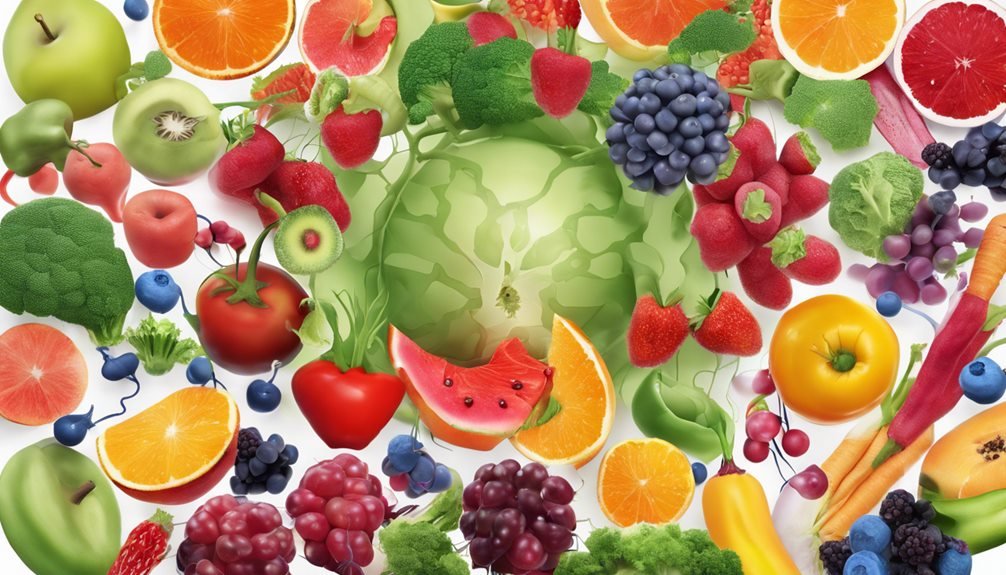
To further explore the benefits of antioxidants, let's now shift our focus towards their role in supporting the immune system.
Antioxidants play a crucial role in maintaining optimal immune health. Here are three key ways in which antioxidants support your immune system:
- Boosting Immune Function: Antioxidants help strengthen the immune system by neutralizing harmful free radicals that can weaken immune responses and make the body more susceptible to infections and diseases.
- Reducing Inflammation: Chronic inflammation can impair immune function. Antioxidants, found in a variety of sources such as fruits, vegetables, nuts, and seeds, help combat inflammation and support overall immune health.
- Enhancing Antiviral Defenses: Certain antioxidants, like vitamin C and E, have been shown to enhance the body's defenses against viruses by supporting the production of white blood cells and antibodies.
Incorporating antioxidant-rich foods into your diet can significantly benefit your immune system and overall well-being.
Antioxidant Myths Debunked
When exploring the realm of antioxidants, it's essential to address prevalent misconceptions that have led to various myths surrounding their efficacy and benefits.
One common myth revolves around the belief that antioxidant supplements are a cure-all for preventing diseases like cancer. However, research indicates that high doses of antioxidant supplements may not always be beneficial and could even have adverse effects on your health. It's important to remember that a balanced diet rich in fruits, vegetables, and whole grains is the best way to naturally obtain antioxidants.
Another myth to debunk is the notion that more antioxidants equate to better health. The truth is that the body needs a delicate balance of antioxidants, and excessive amounts may disrupt this equilibrium. Understanding these antioxidant myths will help you make informed decisions about your health and well-being, steering you away from misconceptions and towards evidence-based practices.
Frequently Asked Questions
Can Antioxidants Completely Prevent Cancer?
Antioxidant supplements and dietary sources can support your body against oxidative stress, a factor linked to cancer development. While they play a role in reducing cancer risk, they may not completely prevent it.
Research suggests that antioxidants work best when obtained through a balanced diet rather than isolated supplements. Incorporating a variety of colorful fruits and vegetables rich in antioxidants can enhance your overall health and potentially lower your cancer risk.
How Do Antioxidants Affect Chemotherapy Outcomes?
When considering how antioxidants affect chemotherapy outcomes, research indicates that antioxidants can influence treatment efficacy by potentially enhancing the immune response.
By supporting the body's defense mechanisms, antioxidants may help improve the body's ability to combat cancer cells during chemotherapy.
This synergistic relationship between antioxidants and the immune system may contribute to better treatment outcomes for individuals undergoing cancer therapy.
Further studies are needed to fully understand the impact of antioxidants on chemotherapy effectiveness.
Are There Risks Associated With Consuming Too Many Antioxidants?
Consuming excessive antioxidant supplementation can have potential side effects. While antioxidants are beneficial in moderation, overconsumption can disrupt the body's natural balance and lead to adverse effects.
High doses of certain antioxidants may interfere with chemotherapy or radiation treatments, reducing their effectiveness. It's crucial to consult with a healthcare provider before taking antioxidant supplements to ensure you're not exceeding safe levels and potentially impacting your cancer treatment outcomes.
Can Antioxidants Reverse Existing Cell Damage?
Yes, antioxidants play a crucial role in cell repair by combating oxidative stress.
Interestingly, studies have shown that antioxidants can indeed reverse existing cell damage to a certain extent. By neutralizing free radicals that cause oxidative stress, antioxidants help repair and protect cells from further harm.
Consuming a balanced amount of antioxidants through a variety of fruits, vegetables, and nuts can support your body's natural repair mechanisms.
Are There Specific Antioxidants That Target Certain Types of Cancer?
When considering antioxidants and cancer, it's crucial to understand that specific antioxidants can indeed target certain types of cancer.
For instance, antioxidants like vitamin C and E have shown potential in combating breast cancer, while compounds in green tea have been linked to potential benefits for lung cancer prevention.
These antioxidants work by neutralizing harmful free radicals that can contribute to cancer development, making them valuable tools in the fight against specific types of cancer.
Conclusion
As you dive into a world of vibrant fruits, dark chocolate indulgence, and nutrient-packed greens, remember the power of antioxidants in shielding your cells from harm. Picture a shield of protection enveloping your body, fighting off free radicals and preventing cancer from taking root. Embrace the colorful array of antioxidant-rich foods and witness the transformation within as your body thrives in a state of prevention and vitality. Embrace antioxidants, embrace health.
